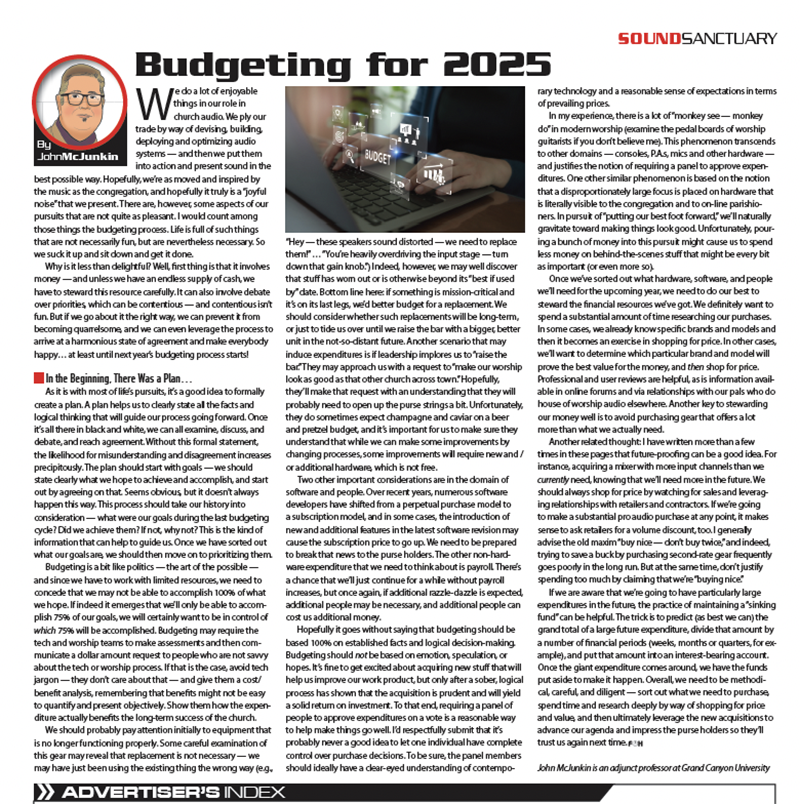One of the main purposes of this column has always been to instigate, implore, motivate and at least hint softly that Houses of Worship need to strive for their own levels of excellence and knowledge when it comes to their technical systems. We can't do it all for you… but we can help.
More often than not, there is a distinct lack of brand names mentioned here, for the simple reason that deciding on function is usually the primary problem and that brand names mean little if the technical task can not ultimately be accomplished. And there are more than a few parameters for every technical task, including things like operator proficiency and budget. On an item-to-item situation these things are usually handled fairly well, but when it comes to a system-wide equipment choice, where even a modest level of integration is involved, it's nearly impossible to click the Internet and make good choices. This is where many good consultants usually end up clashing with otherwise good and sensible church elders. When it comes to building a new audio, lighting or video system for a facility (or extensively integrating into an existing system), we professionals rely on something called physics. Much of the root planning for a good system depends on solving a mathematical equation and not (God forgive me) on anybody's opinions, (gulp) including the person writing the check.
There are plenty of parameters involved where form may override function, in the realm of aesthetics: speaker grille cloth, acoustical treatment colors or exact details on control booth finishes. Budgets may be tweaked based upon less-than-technical factors for things like the quantity of personal monitor channels, the extra wireless lavaliere mics or a couple more moving yoke fixtures. Consultants cannot make those decisions without involving the client.
Notice that I have used the word consultant and not salesperson or AV contractor. Time and time again I have seen churches start major building projects and go out and then get bids from several AV contractors for systems that will be in the realm of $100,000 and up. I wonder what would happen if the same church by-passed the architect and went straight to getting bids for a general contractor for the building? End times would rapidly approach! My question is, what are they bidding on? Are they all bidding on the same thing? Who decided what the "thing" is?
Unfortunately, many church committees find out too late that a good AV contractor will require a lot of information in order to provide a clear, concise and honest project bid. And you will be the only place to get the information, much of which you may not have to give. If you multiply that effort times three, you can begin to see the reality of just how much time it will take to effectively get a few bids.
True, you can try to provide a detailed system performance outline as a handout and cut some time, but in the long run, you will still end up comparing apples and oranges, at which time you can start the process all over again!
It usually takes somewhere beyond a couple hundred hours to provide a complete bid package with schematics and specifications. Trust me, the only defense a quality contractor has against this required effort is price. At the typical equipment profit levels today, you have to sell a lot of equipment to make up for a couple hundred man-hours!
Don't be surprised if you ask for a bid and get paperwork back that seems a little vague or lacking in details. There is
little chance your local or regional contractor could afford to do otherwise on a large project.
At some point, you will pay to get all the documentation you will need (and want). Now I will say that some contractors, like my own company, have the ability to provide consultation and system design and will usually get creative in pro-rating these costs if they are chosen as an equipment provider and installer. Don't expect to get something for nothing, but remember that everything is negotiable.
Even if your project doesn't seem that extensive or your upgrade budget is only $40,000, it is still advantageous to get a couple paid opinions before making the larger investment. I would estimate that in larger systems, a proper design and consult package will cost somewhere between 5% and 8% of the overall budget, and in the end it will be money well spent.
The hours initially spent with a consultant will provide clarity of details in equipment specification, performance requirements and overall project management.
The other benefit is that creating system-as-built drawings (for future reference and maintenance) will require minimal effort or cost and usually are included in a good design-consult package. This not only makes it far simpler for a contractor to price the job more realistically, but also ensures that you will end up with an "apples to apples" situation when comparing bids later. You will almost always get a better end result and you will definitely get your design investment back in the form of project efficiency and more accurate initial bid pricing.
How much better could it be than to hire someone who is simply motivated to assist you rather than be stressed about the AV contractor's requirement to directly profit financially from your relationship? The difference between a consultant
and contractor is that by default, the relationship between contractor and client is adversarial. The clearer you can define requirements up front, the more common the goals will become throughout the process.
Consultants don't have to cost a lot to be effective. I will say in some cases where we have shown up to consult on an hourly basis, a couple hours on-site was enough to motivate the church staff and volunteers to get back on track. Mathematical realities and momentarily setting opinions aside to listen to an expert sometimes work miracles in goal setting and team building. After all, it usually is the quality of the plan, not the size of the budget that makes for a great project.



